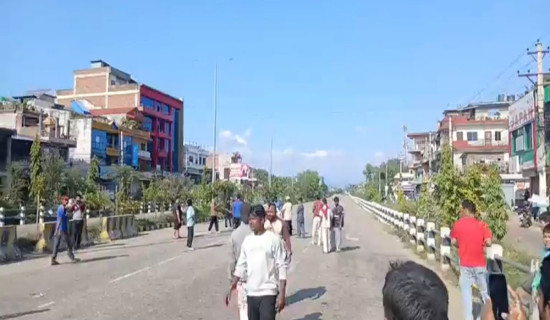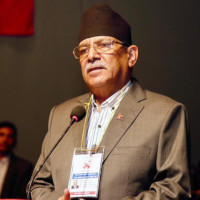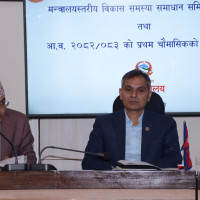- Thursday, 20 November 2025
Pahalgam Terror Attack
India’s Test Of Leadership
The terror attack in Pahalgam, Kashmir, which claimed the lives of 26 tourists, has created a seismic shift in the fragile dynamics between India and Pakistan. This horrific act not only reignited long-standing hostilities but also highlighted the enduring complexities of their geopolitical and historical ties. Both nations have responded with escalatory measures, reflecting their deep mistrust and entrenched differences. The terror attack has plunged India into a state of shock and grief, forcing it to balance its response between demonstrating strength and avoiding the risks of full-scale conflict.
As the horror of the attack reverberates across the country, India accuses Pakistan of providing support and sanctuary to terrorist groups such as Lashkar-e-Taiba and Jaish-e-Mohammed, which have carried out attacks in India, including the 2008 Mumbai attacks and the 2019 Pulwama bombing. Pakistan, however, denies direct involvement, asserting that it provides only moral and diplomatic support to the Kashmiri people. This accusation aligns with India’s longstanding stance on Pakistan’s alleged complicity in enabling cross-border terrorism — a source of friction that has persisted for decades.
Indian actions
In the wake of the attack, India has initiated a series of actions aimed at holding Pakistan accountable. Diplomatic ties have been downgraded, with the expulsion of Pakistani diplomats signalling a significant deterioration in relations. The suspension of the Indus Waters Treaty, a landmark water-sharing agreement, represents one of India’s strongest moves, sending a clear message that agreements based on mutual trust cannot survive in the face of terrorism. Meanwhile, Indian security forces have intensified their counter-terrorism operations in Jammu and Kashmir, targeting known networks and collaborators associated with terrorist groups. These measures reflect India’s resolve not only to seek justice for the victims but also to dismantle the infrastructure that enables such attacks.
Prime Minister Narendra Modi has made unequivocal statements regarding India’s intent to search for the perpetrators to the ends of the earth. His leadership underscores the seriousness with which India views this attack, not merely as an isolated event but as part of a larger struggle against terrorism. India’s military, meanwhile, has heightened its preparedness, conducting missile tests and mobilising resources to signal its readiness to confront any further threats. There is growing speculation about potential strikes on terrorist hideouts in Pakistan-occupied Kashmir.
In the wake of India’s measures, Pakistan has sought to counteract the pressure while maintaining its narrative of denial regarding involvement in the Pahalgam attack. Pakistani Prime Minister Shehbaz Sharif has firmly rejected India’s accusations, labelling them as baseless and inflammatory. He called for an impartial, international investigation to uncover the truth, a move aimed at deflecting blame and showcasing transparency. His government has accused India of using the attack as a pretext to escalate tensions and adopt aggressive policies.
Pakistan’s retaliatory steps have included the expulsion of Indian diplomats and the closure of its airspace to Indian flights, actions that disrupt regional connectivity and diplomatic relations. Sharif also convened a high-level National Security Council meeting to strategise on defence and foreign policy responses. Additionally, Pakistan’s military remains on high alert, anticipating the possibility of targeted strikes by India on terrorist launch pads within Pakistan’s territory. Defence Minister Khawaja Asif suggested that the Pahalgam incident could be a "false flag operation," an attempt by India to justify military aggression and distract from domestic challenges.
Sharif’s warning that any diversion of the Indus River’s water would be considered an “act of war” underscores the high stakes of India’s decision to suspend the Indus Waters Treaty. This treaty, brokered by the World Bank in 1960, is seen as a cornerstone of India-Pakistan relations, and its suspension represents a severe escalation in the broader conflict. The current crisis cannot be understood without delving into the historical context of India-Pakistan relations. The partition of British India in 1947 created two separate nations — India and Pakistan — amidst widespread violence and upheaval. The princely state of Jammu and Kashmir became a flashpoint due to its Muslim-majority population and Hindu ruler, leading to the first India-Pakistan war in 1947–48. Since then, the region has been at the heart of their disputes, with both countries claiming it in full but controlling only parts.
Over the decades, the conflict has evolved from territorial disputes to include issues like terrorism and ideological clashes. The Kashmir conflict is more than just a bilateral dispute between India and Pakistan; it has evolved into a complex geopolitical issue with far-reaching implications. The region's strategic location and the presence of two nuclear-armed countries have made it a focal point of international attention. Historically, the U.S. has alternated between supporting India and Pakistan based on its strategic interests. During the Cold War, Pakistan was a key ally to the U.S., providing strategic access to counter Soviet influence in South Asia.
This partnership extended into military and financial aid for Pakistan, including support for its involvement in Afghanistan during the 1980s. However, post-Cold War, the U.S. has increasingly leaned towards India due to its growing economic power, democratic alignment, and strategic importance in countering China’s rise. Despite this shift, the U.S. has often played a mediatory role, urging restraint and dialogue during periods of heightened India-Pakistan tensions, such as after the 1999 Kargil War and the 2001 Indian Parliament attack.
Territorial disputes
China shares a border with both India and Pakistan and has territorial disputes with India, particularly in the Aksai Chin region of Ladakh, which is part of the broader Kashmir conflict. Historically, China has been a staunch ally of Pakistan, providing economic, military, and political support. This alliance is partly aimed at counterbalancing India’s influence in South Asia. Projects like the China-Pakistan Economic Corridor (CPEC), which passes through Pakistan-occupied Kashmir, reflect China’s strategic interests in the region. India opposes these projects, viewing them as a violation of its sovereignty.
The involvement of the superpowers adds layers of complexity to the Kashmir conflict, making it more difficult to resolve. Their strategic interests often overshadow efforts for peace, with each nation prioritising its geopolitical goals over fostering dialogue between India and Pakistan. The region remains a tinderbox, where localised disputes have the potential to morph into broader global confrontations. India faces the delicate challenge of responding decisively while maintaining stability in a region already fraught with complexity. The unfolding situation reflects a nation’s determination to protect its sovereignty and security, even as it navigates the precarious path of international diplomacy and regional peace.
(A PhD in political science from the State University of New York, Buffalo, the author is a faculty member at IACER. govinda@iacer.edu.np)








-square-thumb.jpg)







